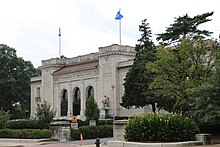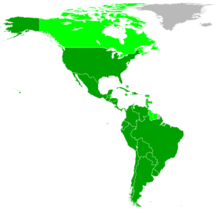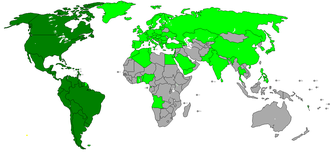Organization of American States
| Organization of American States OAS / OEA |
|
|---|---|
 Member States |
|
| Spanish: Portuguese: French: English: |
Organización de los Estados Americanos Organização dos Estados Americanos Organization des États Américains Organization of American States |
| Organization type | Regional political cooperation |
| Seat of the organs |
Washington, DC , United States |
| Secretary General |
|
| Member States | 35 |
| Official and working languages | |
| founding |
April 30, 1948 |
| www.oas.org | |
The Organization of American States ( English Organization of American States , OAS ; Spanish Organización de los Estados Americanos ; OEA , French Organization des États Américains , OEA ; Portuguese Organização dos Estados Americanos , OEA ) is a regional international organization in America . It was founded on April 30, 1948 in Bogotá , Colombia , and has its headquarters in Washington, DC Members are 35 independent states in North and South America.
On May 26, 2015, the former Uruguayan Foreign Minister Luis Almagro was sworn in to succeed José Miguel Insulza as Secretary General.
aims
According to the charter, the goals are: to promote democratization and human rights, to fight crime and drug trafficking, to secure peace and to create a Pan-American free trade area. The OAS wants to settle disputes between American states peacefully. It can impose sanctions in the event of non-recognition of conciliation procedures and other violations .
The general aim is closer cultural and economic cooperation between the states of the double continent. The regular summits of all democratic American states ( America Summit ) have become an important instrument in this regard . The OAS houses the secretariat of the summit process and is therefore closely involved in its updating.
organs
The organs are the General Assembly, the Permanent Council, the Secretary General and the OAS Administrative Court . There is also the Agency for Cooperation and Development, the Commission for Human Rights and various other specialist agencies and commissions.
Previous general secretaries of the OAS were:
| Term of office | Secretary General | Member State |
|---|---|---|
| 1948-1954 | Alberto Lleras Camargo |
|
| 1954-1955 | Carlos Dávila Espinoza |
|
| 1955-1956 | Wilhelm Manger 1 |
|
| 1956-1968 | José Mora Otero |
|
| 1968-1975 | Galo Plaza Lasso |
|
| 1975-1984 | Alejandro Orfila |
|
| 1984 | Val McComie 1 |
|
| 1984-1994 | João Baena Soares |
|
| 1994 | Christopher R. Thomas 1 |
|
| 1994-2004 | César Gaviria Trujillo |
|
| 2004 | Miguel Ángel Rodríguez Echeverría |
|
| 2004-2005 | Luigi R. Einaudi 1 |
|
| 2005-2015 | José Miguel Insulza |
|
| since 2015 | Luis Almagro |
|
history
The OAS emerged from various Pan-American conferences . On August 30, 1947, a collective inter-American treaty for mutual assistance was signed in Rio de Janeiro , which was initially called the Rio Pact . The final organization under the current name came about on April 30, 1948 in Bogotá. On the same day, the American Treaty on Peaceful Dispute Settlement , also known as the Bogotá Pact , was concluded.
For some, the OAS was an instrument of the United States from the beginning in the looming East-West conflict, especially since the United States exerted considerable influence on the organization's politics by providing a large part of the regular budget and having its headquarters in Washington, D.C. For example, on January 22, 1962, under pressure from the USA, Cuba was excluded from participating in the organization's activities because of its “Marxist-Leninist” turn.
There has also been an Inter-American Human Rights Commission (IACHR / CIDH) since 1959 , which has been the main body of the OAS since 1970. In 1979, after the American Convention on Human Rights, which had already been adopted in 1969, came into force (1978), the Inter- American Human Rights Court in San José, Costa Rica, was added as a further body for the promotion and defense of human rights. Even though the OAS had more authoritarian / dictatorial than democratic member states in its ranks, especially in the 1970s, the so-called inter-American human rights system (initially above all the Commission) was able to identify human rights violations in, for example, Chile, Argentina, Nicaragua Somozas or El Salvador make the public in the hemisphere aware of the violations.
In 1991, the OAS General Assembly in Santiago de Chile passed resolution 1081, which contained severe restrictions on the organization's once sacrosanct principle of non-interference. Ten years later, on September 11, 2001, the Inter-American Democracy Charter was passed, continuing this trend.
At the OAS General Assembly in Honduras on June 3, 2009, it was decided to revoke the 1962 suspension of Cuba's participation rights without any preconditions. However, there is no automatic mechanism for the country to return to the international community. Cuba welcomed the decision, but declared - as has already been done several times in advance - its lack of interest in resuming its work in the organization, since it regards this as anachronistic and subordinate to the interests of the USA.
On July 4, 2009, the OAS suspended Honduras' participation rights. This came after the Honduran interim government refused to restore constitutional order after the June 28, 2009 coup . After the USA tried to manipulate the OAS in the wake of the coup in Honduras, the Community of Latin American and Caribbean States ( Comunidad de Estados Latinoamericanos y Caribeños , CELAC for short ) was founded on February 23, 2010 , consisting of all member states the OAS exists except for the USA and Canada. In 2011 the suspension was withdrawn.
In 2013, a change in policy against soft drugs was discussed in many Central and South American countries (see here for details ). The Secretary General of the OAS (Insulza) welcomed an initiative by the country of Uruguay .
On April 26, 2017, Venezuelan President Nicolás Maduro announced that his country would withdraw from the OAS. The exit process will take a total of two years. The OAS Secretary General had repeatedly criticized the Venezuelan government for failing to comply with democratic norms. The background to this is the regime's refusal to hold the constitutional regional elections and the referendum originally scheduled for 2016 to recall the president . Maduro accused the organization of meddling in the country's internal affairs. In March of the same year the OAS threatened Venezuela with the termination of membership from the international community.
Members
-
 Argentina (1948)
Argentina (1948) -
 Bolivia (1948)
Bolivia (1948) -
 Brazil (1948)
Brazil (1948) -
 Chile (1948)
Chile (1948) -
 Costa Rica (1948)
Costa Rica (1948) -
 Dominican Republic (1948)
Dominican Republic (1948) -
 Ecuador (1948)
Ecuador (1948) -
 El Salvador (1948)
El Salvador (1948) -
 Guatemala (1948)
Guatemala (1948) -
 Haiti (1948)
Haiti (1948) -
 Honduras (1948)
Honduras (1948) -
 Colombia (1948)
Colombia (1948) -
 Cuba (1948) 2
Cuba (1948) 2
-
 Mexico (1948)
Mexico (1948) -
 Nicaragua (1948)
Nicaragua (1948) -
 Panama (1948)
Panama (1948) -
 Paraguay (1948)
Paraguay (1948) -
 Peru (1948)
Peru (1948) -
 Uruguay (1948)
Uruguay (1948) -
 Venezuela (1948) 3
Venezuela (1948) 3
-
 United States (1948)
United States (1948) -
 Barbados (1967)
Barbados (1967) -
 Trinidad and Tobago (1967)
Trinidad and Tobago (1967) -
 Jamaica (1969)
Jamaica (1969) -
 Grenada (1975)
Grenada (1975) -
 Suriname (1977)
Suriname (1977) -
 Dominica (1979)
Dominica (1979) -
 St. Lucia (1979)
St. Lucia (1979) -
 Antigua and Barbuda (1981)
Antigua and Barbuda (1981) -
 St. Vincent and the Grenadines (1981)
St. Vincent and the Grenadines (1981) -
 Bahamas (1982)
Bahamas (1982) -
 St. Kitts and Nevis (1984)
St. Kitts and Nevis (1984) -
 Canada (1990)
Canada (1990) -
 Belize (1991)
Belize (1991) -
 Guyana (1991)
Guyana (1991)
observer
-
 Egypt
Egypt
-
 Albania
Albania
-
 Algeria
Algeria
-
 Angola
Angola
-
 Equatorial Guinea
Equatorial Guinea
-
 Armenia
Armenia
-
 Azerbaijan
Azerbaijan
-
 Benin
Benin
-
 Bosnia and Herzegovina
Bosnia and Herzegovina
-
 Georgia
Georgia
-
 Ghana
Ghana
-
 India
India
-
 Iceland
Iceland
-
 Israel
Israel
-
 Japan
Japan
-
 Yemen
Yemen
-
 Kazakhstan
Kazakhstan
-
 Qatar
Qatar
-
 Lebanon
Lebanon
-
 Morocco
Morocco
-
 Monaco
Monaco
-
 Nigeria
Nigeria
-
 North Macedonia
North Macedonia
-
 Norway
Norway
-
 Pakistan
Pakistan
-
 Philippines
Philippines
-
 Russia
Russia
-
 Saudi Arabia
Saudi Arabia
-
 Switzerland
Switzerland
-
 Serbia
Serbia
-
 Sri Lanka
Sri Lanka
-
 South Korea
South Korea
-
 Thailand
Thailand
-
 Tunisia
Tunisia
-
 Turkey
Turkey
-
 Ukraine
Ukraine
-
 Vanuatu
Vanuatu
-
 Vatican city
Vatican city
-
 United Kingdom
United Kingdom
-
 People's Republic of China
People's Republic of China
-
 European Union 4
European Union 4
See also
literature
- Klaas Dykmann: Philanthropic Endeavors or the Exploitation of an Ideal? The Human Rights Policy of the Organization of American States. 1970-1991. Vervuert, Frankfurt am Main / Madrid 2004, ISBN 3-86527-165-0 .
- Cecilia Medina Quiroga: The Battle of human rights. Gross, systematic violations and the inter-American system . Nijhoff, Dordrecht 1988, ISBN 90-247-3687-0 .
- David Sheinin (Ed.): Pan Americanism in Inter-American Affairs. Greenwood, Westport, CT 2000, ISBN 0-275-96980-0 .
- O. Carlos Stoetzer: The Organization of American States . Greenwood, Westport, CT 1993, ISBN 0-275-93633-3 .
- Larman C. Wilson, David W. Dent: The United States and the OAS. In: David W. Dent (Ed.): US-Latin American Policymaking: A Reference Handbook. Greenwood, Westport, CT 1995, ISBN 0-313-27951-9 , pp. 24-44.
Web links
- Official website
- Database of literature on the social, political and economic situation in the organization of American states
Individual evidence
- ^ Secretary General. In: oas.org. Retrieved July 14, 2020 .
- ^ First Summit of the Americas. In: oas.org. December 11, 1994, accessed October 27, 2018 .
- ^ Organization of American States. In: rulers.org. Retrieved October 28, 2018 .
- ^ RP online: Fidel Castro: The development of a revolutionary. Retrieved January 22, 2012 .
- ^ Exclusion of the Present Government of Cuba From Participation in the Inter-American System , Resolution VI Adopted at the Eighth Meeting of Consultation of Ministers of Foreign Affairs of January 31, 1962.
- ^ Resolution on Cuba , OAS Doc. AG / RES. 2438 (XXXIX-O / 09) of June 3, 2009 .
- ↑ Harald Neuber: OAS opens the door for Cuba. In: ag-friedensforschung.de. June 5, 2009, accessed May 6, 2020 .
- ^ Cuba refuses to return to the Organization of American States , RIA Novost, June 8, 2009.
- ^ Suspension of the Right of Honduras to Participate in the Organization of American States , OAS Doc. AG / RES. 2 (XXXVII-E / 09) of July 4, 2009 .
- ^ Mark Weisbrot: What Manuel Zelaya's return means for Honduras , The Guardian , May 28, 2011.
- ↑ Klaus Ehringfeld: Marihuana in Uruguay: America's Drug Experimental Laboratory. In: Spiegel Online . September 15, 2013, accessed October 30, 2018 .
- ↑ Uruguay: Parliament votes for legalization of marijuana. In: Spiegel Online . August 1, 2013, accessed October 30, 2018 .
- ↑ a b Jürgen Vogt: Venezuela leaves the OAS. Escaped expulsion. In: taz.de. April 27, 2017. Retrieved April 27, 2017 .
- ^ Maduro: Venezuela sale de la OEA y rompe con el intervencionismo imperial. In: Telesur. April 26, 2017. Retrieved April 27, 2017 (Spanish).
- ↑ Federation of states threatens Venezuela with exclusion. In: Zeit Online. March 15, 2017. Retrieved April 27, 2017 .




